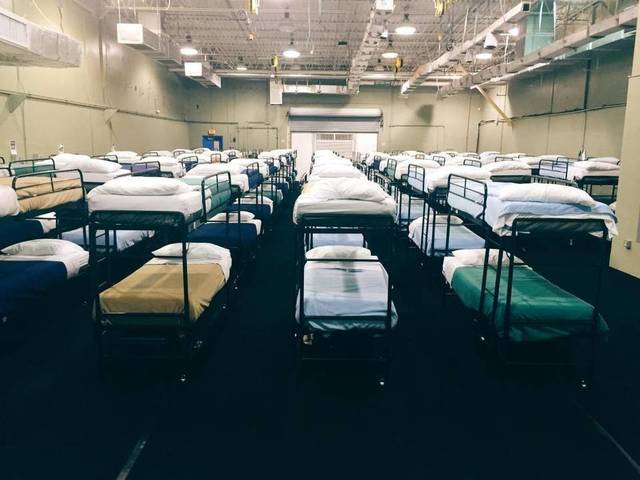This Is No ‘Shelter’ for Children
Here's what the Biden team must know about the detention center they plan to reopen in Florida.

This page was published 4 years ago. Find the latest on Earthjustice’s work.
The Biden administration has announced a plan to reopen a for-profit detention center located in Homestead, Florida, as a surge facility for children who arrived unaccompanied or were separated from their families at the border.
Homestead Detention Center, now known as Biscayne Influx Care Facility, was closed in August 2019 after public outcry over the facility’s unsafe conditions. Now it’s back in the news, as the Biden administration deals with the entangled immigration and COVID-19 crises.
“The Biden administration should be focusing on reuniting children with their families, rather than expanding our ability to detain children.”
While the administration refers to Homestead as a “shelter,” the facility has long been criticized as the functional equivalent of a prison. These semantic justifications also do nothing to address the fact that the facility is near a highly toxic site and is unsafe for children and workers.
Earthjustice and our client, American Friends Service Committee (AFSC), along with a nationwide human rights coalition, are calling on the Biden administration to permanently close Homestead.
“Detention centers are not a place for children,” says Lis-Marie Alvarado, program director of AFSC. “It is going to be impossible to maintain COVID safety regulations. These children, who have already experienced significant trauma, are being subjected to so many unnecessary risks, from hurricanes to sexual assault in a facility being run for profit and by people with no experience or investment in their well-being.”
Homestead was once the largest juvenile detention center in the United States. The facility housed thousands of children ages 13 to 17, some of whom had been separated from their parents. Multiple children reported sexual abuse at the hands of Homestead employees, which led to the firing and resignation of several employees.
The news of this reopening comes just after the administration reopened a juvenile detention facility with 700 beds in Carrizo Springs, Texas.
Homestead, which is operated by for-profit private contractors, is less than one mile from the Homestead Air Force Base Superfund site, which contains eight hotspots polluted by 16 different contaminants.
“There is no guarantee or indication that this facility is safe for the children detained there,” says Dominique Burkhardt, an attorney for Earthjustice. “We know that the surrounding area is plagued with pervasive environmental pollutants, and the ongoing lack of transparency and unresponsive to our FOIA requests for more information is incredibly concerning.”
The contaminants found in the soil and groundwater at these sources include metals, pesticides, semi-volatile and volatile organic compounds, and chlorinated volatile compounds resulting from leaks, spills, waste handling of hazardous materials, and other industrial and military processes. Many of the contaminants are cancer-causing and can lead to a variety of other serious and chronic health problems, including kidney failure, blood disorders, and developmental damage.
In 2019, these safety concerns led Earthjustice to submit Freedom of Information Act (FOIA) requests to multiple federal agencies seeking documents about contamination and other safety risks. The documents made available thus far reveal the presence of asbestos, lead-based paint, mold, and polychlorinated biphenyl at Homestead. Some, but not all, have been remediated according to a 2018 environmental assessment.
Key federal agencies, however, have been evading their duty to respond to Earthjustice’s FOIA requests.
The Environmental Protection Agency advised that any records of environmental testing at the detention center site would be in the possession of the Air Force, since the detention center is adjacent to the Homestead Air Reserve Base. After 19 months of unresponsiveness and delay — well over the 20 business days required by law for a federal agency to respond to a FOIA request — Earthjustice is still waiting for a response to its records request to the Air Force.
The Department of Homeland Security transferred Earthjustice’s request to Immigration and Customs Enforcement (ICE). Despite numerous follow-up attempts, ICE has yet to respond.
The conditions at Homestead are not unique. The federal government has shown flagrant disregard for the health of those in its custody.
Reported abuses have included forced sterilization, the use of industrial chemical disinfectants at other migrant detention facilities, uncontrolled COVID-19 outbreaks, and attempts to build other facilities on highly toxic Superfund sites.
These ongoing failures have created conditions that make it impossible to keep those in custody safe. Therefore, we are calling for the immediate release of everyone being held in migrant detention facilities to safe housing with their families or sponsors.
“The Biden administration should be focusing on reuniting children with their families, rather than expanding our ability to detain children,” says de la Cruz. “The community fought so hard to close this facility, to protect children from all of its hazards, and it’s unconscionable that it could be reopening. It’s disappointing to have to have this same fight all over again, but we’ll do everything in our power to block the detention center from reopening.”
The Florida regional office wields the power of the law to protect our waterways and biodiversity, promote a just and reliable transition to clean energy, and defend communities disproportionately burdened by pollution.